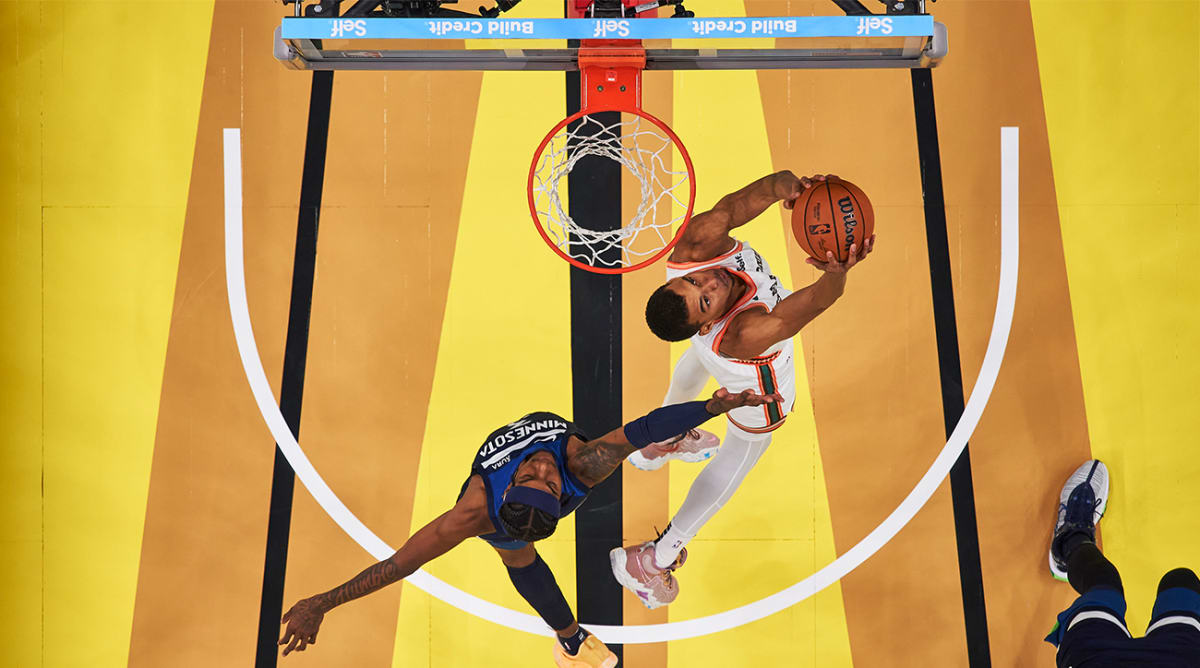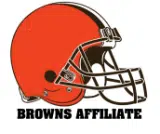The image, frankly, was a little jarring. Kevin Durant, the Durantula, the 6’10” forward with the 7’5″ wingspan, the former MVP who turbocharged the evolution of the big man when he entered the NBA in 2007, standing at the free throw lane in the shadow of Victor Wembanyama, the next iteration of it. An “avatar version” of Durant, said Raptors coach Darko Rajaković, who watched the game on TV.
In his teens—early teens, actually—Wembanyama studied Durant, marveling at his skill set. “I like the fact that for years and years nobody found a way to guard him consistently,” said Wembanyama.
After Wembanyama scored 38 points in a November game against Phoenix, Durant could only marvel. “He’s different,” the Suns forward said, adding that Wemby, officially listed at 7’4″ with a wingspan stretching eight feet, “is going to create his own lane that’s much different than anybody who’s ever played.”

Greg Nelson/SI
Not since LeBron James has a top draft pick entered the NBA with such lofty expectations, and, like James, Wembanyama is living up to them. He racked up a 21-point, 12-rebound double double in his second NBA game. He cracked 30 in his fifth. He collected 103 points, 40 rebounds and 11 blocks in his first five games, the first rookie since Shaquille O’Neal to accomplish that. He became the third teenager to post a 38-point, 10-rebound, two-block stat line, joining James and Durant. After Wembanyama’s 29-point, nine-rebound effort against Minnesota, T-Wolves center Rudy Gobert, a countryman and longtime mentor to Wembanyama, declared himself a “proud dad.” Said Gobert, “He is going to be a real problem.”
Over the past two decades, the role of the big man has been largely redefined. Gone is the preference for the physical rim protectors, the Ewings, the Robinsons, the O’Neals. Instead, there’s been an influx of fluid, three-point shooters. Kristaps Porziņǵis, Brook Lopez and Nikola Vučević are all marksmen. The NBA’s best passer—not passing big man, passer—might be Nikola Jokić, the Nuggets’ center and two-time MVP.
Wembanyama, 19, is the latest version, like if a modern big man got a system update. He’s as comfortable nutmegging an opponent in transition (sorry, Reggie Bullock) as he is overwhelming them in the paint. He can fluidly pick-and-pop for three or slip a screen and finish at the rim. Spurs guard Tre Jones called tossing Wembanyama lobs “a cheat code,” and teammate Devin Vassell said, “I don’t understand how he does some of the stuff he does.”
In a few months Wembanyama has amassed a season’s worth of highlights. A preseason dunk over the Heat’s Thomas Bryant from outside the restricted area. A flat-footed block of OG Anunoby. Pull-up threes in transition and spectacular finishes at the rim. “He’s lived up to the billing,” said Knicks coach Tom Thibodeau, after Wembanyama suffered through a rare off night (14 points and nine rebounds) in his Madison Square Garden debut.
Such slipups are to be expected from a player still so early in his development. And in San Antonio, Wembanyama has landed in an ideal incubator. During a decades-long dynasty, the Spurs molded a generation of overseas imports such as Tony Parker and Manu Ginóbili. It was Gregg Popovich who developed them and it is Popovich, who recently signed a long-term contract extension with the franchise at the age of 74, who will oversee the Wembanyama Project. Popovich has enlisted Ginóbili as an unofficial member of the coaching staff, working directly with Wembanyama. “There’s never been anybody like [Victor], but what I always say is he’s still a kid,” Ginóbili said on (where else?) Parker’s podcast. “You got to be patient. He’s going to be extraordinary, but there’s work to be done.”
For Wembanyama, the connection with Popovich was immediate. “He just learned to know me quicker than almost anyone I’ve met in my life before,” said Wembanyama.
Popovich, meanwhile, quickly realized the spotlight on Wembanyama—the Spurs issued 200 media credentials for his regular-season debut, and a legion of foreign press follow him on the road—wasn’t going to faze him. “Fortunately for us, he’s a really mature, prioritized young man and knows what he wants,” said Popovich. “He’s already a pro; he’s a professional. I don’t have to teach him what it means to be a pro. His parents and other coaches have already done that.”
There will be no pressure on Wembanyama from Popovich or San Antonio. Wembanyama has center size, but the Spurs routinely pair him with Zach Collins or Charles Bassey, physical bigs who allow Wembanyama to roam. And while flashes of early-season success have been nice, San Antonio is playing the long game. Develop now, worry about winning later. Which means allowing Wembanyama to play through early mistakes. “We promised ourselves as a staff we were going to watch him for a while,” said Popovich. “We just want to observe . . . make sure we don’t skip steps but don’t overcoach right off the bat.”
That suits Wembanyama. Between Parker, France’s most accomplished NBA player, and Boris Diaw, the former Spur who is now the general manager of the French national team, Wembanyama has seen firsthand the kind of players who once carried San Antonio to the postseason for 22 straight years—a streak that began five years before he was born. Now Wembanyama looks to not just replicate their success, but also to surpass it. “I don’t want to limit myself to what’s already been done,” he said. “I don’t want to limit myself to what’s conventional.”
Indeed, there’s little danger of that.


















